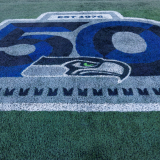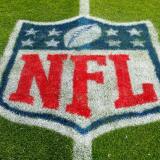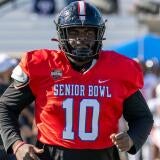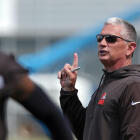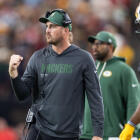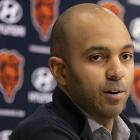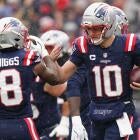
Lions Report Card: Offensive inefficiency, depth issues lead to loss
Midway through the fourth quarter of Sunday*s 24-20 loss to the Packers at Ford Field, the Lions looked like a team that was on its way to a win that would keep their slim hopes of returning to the postseason alive. Then everything fell apart.
 |
| Lions QB Matthew Stafford had an off-day against the Packers. It couldn't have come at a worse time, with Detroit's season possibly hanging in the balance. (US Presswire) |
Midway through the fourth quarter of Sunday’s 24-20 loss to the Packers at Ford Field, the Lions looked like a team that was on its way to a win that would keep their slim hopes of returning to the postseason alive. They had stymied Packers’ quarterback Aaron Rodgers for most of the afternoon, moved the ball well offensively despite a less-than-stellar performance by quarterback Matthew Stafford, and limited the impact of potent Packer KR/WR Randall Cobb.
Then everything fell apart.
By Detroit’s own admission, the team had its worst offensive and defensive series’ on the last two meaningful drives of the game. The offense couldn’t score a touchdown after earning a first-and goal at the Packer 10-yard line, and the resulting field goal opened the door for Rodgers to lead Green Bay on a game-winning drive that exploited a tired Lions’ defense.
Detroit’s starters have repeatedly proved that they can play on equal footing with any team in the league, but they’re often inconsistent. That inconsistency allowed Green Bay to stay in Sunday’s game setting the stage for the loss.
Offense: C
Stafford picked a horrible time to have his worst game of the season. His two solid throws -- a 25-yard touchdown and 53-yard bomb, both to Calvin Johnson -- were overshadowed by several off-target passes and poor decisions. Stafford’s poor 17-for-39 performance was compounded by his three turnovers (2 INT, 1 fumble). It’s unclear whether Stafford’s difficulties are the result of his mechanics, offensive coordinator Scott Linehan’s game plan, or inconsistent wide receiver play, but the Lions had better figure out a way to get his game back on track -- fast.
Johnson had 143 receiving yards and a touchdown, but his effort was far from dominant. Johnson caught only five of his 11 targets, and 78 of his 143 yards came on two plays. To describe Titus Young’s effort as lazy would be generous. Young was targeted only once, but that’s largely due to the fact that his routes didn’t create enough space for Stafford to find him. TEs Brandon Pettigrew and Tony Scheffler were ineffective all game. The pair combined for seven catches on 21 targets, gaining just 44 total yards.
RB Mikel Leshoure gained a respectable 84 yards on 19 carries, and scored one of Detroit’s two touchdowns. Several of his gains came as a result of solid cuts, which is a dimension that his game has lacked in recent weeks.
The O-line protected Stafford well until T Jeff Backus left the game with a hamstring injury. A lightning rod for unjustified fan criticism, Backus’ absence was felt when rookie Riley Reiff struggled to contain the Packers’ pass rush.
The Lions scored on all four of their red zone trips, but they will rue an inability to get touchdowns on two of the drives. Coach Jim Schwartz has stressed the importance of not settling for field goals in red-zone situations all year, and his point was proven Sunday when the eight points Detroit left on the field proved to be the difference in the game. Previous game’s grade: C
Defense: C
It’s tough to fault a unit that only surrendered 17 points to the Packers’ potent offense and all three levels of the defense deserve credit for their play through the first three and a half quarters. Detroit’s defensive line controlled the play from scrimmage for most of the game. Nick Fairley’s performance was unquestionably the best of his career. He finished the game with seven tackles, two sacks, and a forced fumble.
Fairley’s partnership with Ndamukong Suh eliminated most of Packers’ RB James Starks’ rushing lanes, and he finished with just 74 rushing yards on 25 carries. DEs Kyle Vanden Bosch and Cliff Avril eliminated Rodgers’ ability to scramble for most of the game, taking pressure of Detroit’s injury-depleted secondary.
The linebacking corps also played well until late in the fourth quarter. DeAndre Levy had a team-leading six solo tackles along with two assists, and Stephen Tulloch added nine stops. Justin Durant used effective gap rushes to provide delayed pressure on Rodgers.
The secondary did well in the first half, but the unit’s lack of depth eventually cost Detroit. Cornerback Jacob Lacey’s second-quarter interception was a bright spot. His coverage on the play represented one of the better route reads that a Lions’ defensive back has made all year.
The Defense’s solid effort for the first three quarters was ruined by porous defending on the Packers’ game-winning drive. Several missed tackles on a 40-yard pass play from Rodgers to TE Jermichael Finley set up the game winning TD pass to Cobb, which was also the result of a defensive lapse. The secondary had no answer for Rodgers when it counted. He completed seven of nine passes for 112 yards in the second half. Previous game’s grade: C
Special Teams: B-
After struggling in Detroit’s last two games, punter Nick Harris averaged a respectable 39.3 yards per kick, holding Cobb without a punt return. Kicker Jason Hanson was equally effective, converting two field goals, and placing kickoffs in a position that allowed his coverage teams to limit Cobb to just 17 yards per kick return. KR Stefan Logan continues to struggle. Logan fumbled one punt, and seemed hesitant to attack several other kicks. Previous game’s grade: C
Coaching: C+
Defensive coordinator Gunther Cunningham deserves credit for a game plan that seemed to confuse the Packers until fatigued Lions’ players gave Rodgers the upper hand. By contrast, offensive coordinator Scott Linehan’s predictable playcalling -- especially in red zone situations -- gave the Packers’ defense an advantage. Previous game’s grade: D
Follow Lions reporter John Kreger on Twitter at @CBSLions and @JohnKreger


